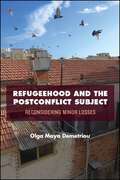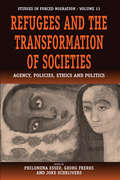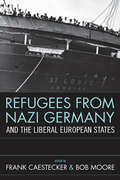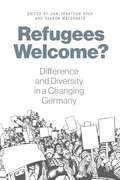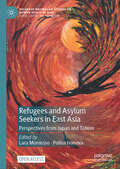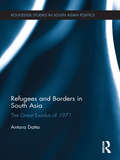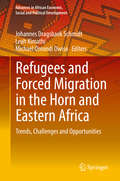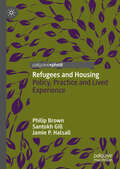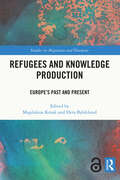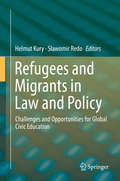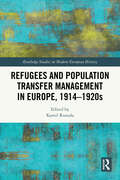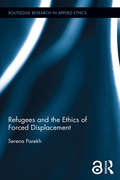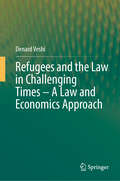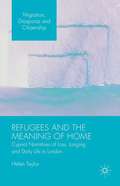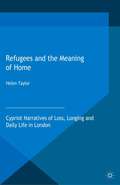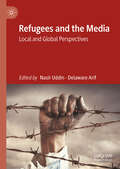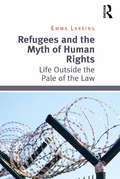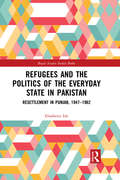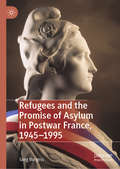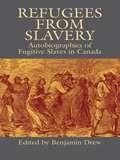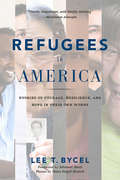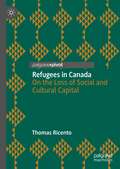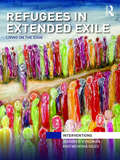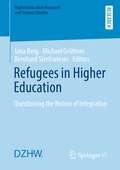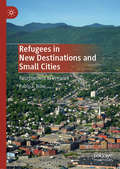- Table View
- List View
Refugeehood and the Postconflict Subject: Reconsidering Minor Losses (SUNY series in National Identities)
by Olga Maya DemetriouBeing a "refugee" is not simply a matter of law, determination procedures, or the act of flight. It is an ontological condition, structured by the politics of law, affect, and territory. Refugeehood and the Postconflict Subject explores the variable facets of refugeehood, their interconnections, and their intended and unintended consequences. Grounded on more than a decade of research on the island of Cyprus, Olga Maya Demetriou considers how different groups of "refugees" coexist and how this coexistence invites reinterpretations of the law and its politics. The long-standing political conflict in Cyprus produced not only the paradigmatic, formally recognized "refugee" but also other groups of displaced persons not so categorized. By examining the people and circumstances, Demetriou reveals the tensions and contestations within the international refugee regimes and argues that any reinterpretation that accounts for these tensions also needs to recognize that these "minor" losses are not incidental to refugeehood but an intrinsic part of the wider issues.
Refugees And The Transformation Of Societies
by Joke Schrijvers Philomena Essed Georg FrerksThe refusal or reception of refugees has had serious implications for the social policies and social realities of numerous countries in east and west. Exploring experiences, interpretations and practices of 'refugees,' 'the internally displaced' and 'returnees' in or emerging from societies in violent conflict, this volume challenges prevailing orthodoxies and encourages new developments in refugee studies. It also addresses the ethics and politics of interventions by professionals and policy makers, using case studies of refugees from or in South Asia, the Middle East, North Africa, Europe and the Americas. These illustrate the dynamic nature of situations where refugees, policy- makers and practitioners interact in trying to construct new livelihoods in transforming societies. Without a proper understanding of this dynamic nature, so the volume argues overall, it is not possible to develop successful strategies for the accommodation and integration of refugees.
Refugees From Nazi Germany and the Liberal European States
by Bob Moore Frank CaesteckerThe exodus of refugees from Nazi Germany in the 1930s has received far more attention from historians, social scientists, and demographers than many other migrations and persecutions in Europe. However, as a result of the overwhelming attention that has been given to the Holocaust within the historiography of Europe and the Second World War, the issues surrounding the flight of people from Nazi Germany prior to 1939 have been seen as Vorgeschichte (pre-history), implicating the Western European democracies and the United States as bystanders only in the impending tragedy. Based on a comparative analysis of national case studies, this volume deals with the challenges that the pre-1939 movement of refugees from Germany and Austria posed to the immigration controls in the countries of interwar Europe. Although Europe takes center-stage, this volume also looks beyond, to the Middle East, Asia and America. This global perspective outlines the constraints under which European policy makers (and the refugees) had to make decisions. By also considering the social implications of policies that became increasingly protectionist and nationalistic, and bringing into focus the similarities and differences between European liberal states in admitting the refugees, it offers an important contribution to the wider field of research on political and administrative practices.
Refugees Welcome?: Difference and Diversity in a Changing Germany
by Sharon Macdonald Jan-Jonathan BockThe arrival in 2015 and 2016 of over one million asylum seekers and refugees in Germany had major social consequences and gave rise to extensive debates about the nature of cultural diversity and collective life. This volume examines the responses and implications of what was widely seen as the most significant and contested social change since German reunification in 1990. It combines in-depth studies based on anthropological fieldwork with analyses of the longer trajectories of migration and social change. Its original conclusions have significance not only for Germany but also for the understanding of diversity and difference more widely.
Refugees and Asylum Seekers in East Asia: Perspectives from Japan and Taiwan (Palgrave Macmillan Studies on Human Rights in Asia)
by Polina Ivanova Lara MomessoThis edited volume fills a gap in current research on asylum seekers and refugees. By focusing on two East Asian countries, Japan and Taiwan, this volume offers material for comparison and reflection on an area of the world in which this theme is still relatively underdeveloped. By approaching the theme through the different perspectives of human rights, social construction through media representation and public opinion, and lived experiences, the book offers a multifaceted and sophisticated analysis of the phenomenon. The main aim of this collection is to expand current scholarship on refugee studies and offer policy recommendations on the timely topic of refugee and asylum seekers in East Asia. This is an open access book.
Refugees and Borders in South Asia: The Great Exodus of 1971 (Routledge Studies in South Asian Politics)
by Antara DattaThe crisis in East Pakistan in 1971, which preceded the birth of Bangladesh, led to ten million refugees crossing the border into India. This book argues that this massive influx of refugees within a few short months changed ideas about citizenship and belonging in South Asia. The book looks at how the Indian state, while generously keeping its borders open to the refugees, made it clear that these refugees were different from those generated by Partition, and would not be allowed to settle permanently. It discusses how the state was breaking its ‘effective’ link between refugees and citizenship, and how at the same time a second ‘affective’ border was developing between those living in the border areas, especially in Assam and West Bengal. Moving beyond the refugee narratives created by Partition, this book argues that these ‘effective’ and ‘affective’ borders generated by the refugee crisis in 1971 form part of the longer historical trajectory of the current political debate regarding ‘illegal infiltration’ from Bangladesh . It goes on to analyse the aftermath of the 1971 war and the massive repatriation project undertaken by the governments of India, Pakistan and Bangladesh to examine ways in which questions about minorities and belonging remained unresolved post-1971. The book is an interesting contribution to the history of refugees, border-making and 1971 in South Asia, as well as to studies in politics and international relations.
Refugees and Forced Migration in the Horn and Eastern Africa: Trends, Challenges and Opportunities (Advances in African Economic, Social and Political Development)
by Johannes Dragsbaek Schmidt Leah Kimathi Michael Omondi OwisoThis volume sheds new light on the refugees and forced migration at the Horn of Africa and East Africa. Adopting a multidisciplinary perspective, it traces historical, structural, and geopolitical factors to reveal the often brutal uprooting of people in a region that hosts more than three million refugees and almost six million internally displaced persons (IDPs). By doing so, it enriches our understanding of the socio-economic, geopolitical and humanitarian causes and implications of migration and population displacement.The book is divided into five parts, focusing on different drivers of involuntary displacement and people’s uprooting: The first part covers geopolitical conflicts rooted partly in the colonial and Cold War geographies. The second part then focuses on security aspects and conflicts, while the third looks at encampment and refugee policies as well as refugee agencies. Part four highlights issues of forced repatriation and human trafficking. Lastly, part five analyzes the dynamics of refugee camps.
Refugees and Housing: Policy, Practice and Lived Experience
by Philip Brown Jamie P. Halsall Santokh GillHousing has always had a close association with the lives refugees lead in exile and the settlement of refugees is, at its core, a housing issue. Refugees move from their home, perhaps through various other places, to finally arrive in a nation-state which provides them with security of status and the promise of assistance to continue their lives. At the foundation of this promise of refuge is the provision of a safe and secure home. Despite this, the knowledge base about housing and its significance in the lives of refugees is not fully understood and this risks understating the enormous impact housing has on the settlement of refugees more broadly. This book makes an important contribution to the literature on the relationship between sanctuary and housing. It draws on new empirical research to examine how refugees have transitioned through the housing system over the last three decades and how changes in policy and the routes into refugee status has mediated these experiences.
Refugees and Knowledge Production: Europe's Past and Present (Studies in Migration and Diaspora)
by Heta Björklund Magdalena KmakBuilding on research within the fields of exile studies and critical migration studies and drawing links between historical and contemporary ‘refugee scholarship’, this volume challenges the bias of methodological nationalism and Eurocentrism in discussing the multifaceted forms of knowledge emerging in the context of migration and mobility. With critical attention to the meaning, production and scope of ‘refugee scholarship’ generated at the institutions of higher education, it also focuses on ‘refugee knowledge’ produced outside academia, and scrutinizes the conditions according to which it is validated or silenced. Presenting studies of historical refuge and exile, together with the experiences of contemporary refugee scholars, this book will appeal to scholars across the social sciences with interests in forced migration, refugee studies, the sociology of knowledge and the phenomenon of ‘insider’ knowledge, and research methods and methodology.
Refugees and Migrants in Law and Policy: Challenges And Opportunities For Global Civic Education
by Helmut Kury Sławomir RedoRefugees and migration are not a new story in the history of humankind, but in the last few years, against a backdrop of huge numbers of migrants, especially from war-torn countries, they have again been a topic of intensive and contentious discussion in politics, the media and scientific publications. Two United Nations framework declarations on the sustainable development goals and on refugees and migrants adopted in 2016 have prompted the editors – who have a background in international criminology – to invite 60 contributors from different countries to contribute their expertise on civic education aspects of the refugee and migrant crisis in the Global North and South. Comprising 35 articles, this book presents an overview of the interdisciplinary issues involved in irregular migration around the world. It is intended for educationists, educators, diplomats, those working in mass media, decision-makers, criminologists and other specialists faced with questions involving refugees and migrants as well as those interested in improving the prospects of orderly, safe, regular and responsible migration in the context of promoting peaceful and inclusive societies for sustainable development. Rather than a timeline for migration policies based on “now”, with states focusing on “stopping migration now”, “sending back migrants now” or “bringing in technicians or low-skilled migrant workers now”, there should be a long-term strategy for multicultural integration and economic assimilation. This book, prefaced by François Crépeau, the United Nations Special Rapporteur on the human rights of migrants, and William Lacy Swing, Director-General of the International Organization for Migration, addresses the question of the rights and responsibilities involved in migration from the academic and practical perspectives of experts in the field of social sciences and welfare, and charts the way forward to 2030 and beyond, and also beyond the paradigm of political correctness.
Refugees and Population Transfer Management in Europe, 1914–1920s (Routledge Studies in Modern European History)
by Kamil RuszałaThis book provides a comprehensive study of refugee movements and population transfers across Europe during the First World War and the early postwar period.Drawing parallels with contemporary migration issues, the book serves a social and educational purpose by highlighting Europe's history of migration and emphasizing the relevance of past experiences to current challenges. It seeks to enhance understanding, raise social awareness, and contribute to the broader discourse on war refugeeism by applying historical insights to address contemporary migration crises.The authors discuss how issues of refugee movements and population transfers were addressed in different contexts and reflect on refugees as both war-induced migrants and political tools for authorities. The book covers a range of topics including humanitarian systems during the war and the early postwar period, refugee locations, policy influence, national issues, self-organization, and aid for refugees, as well as immigration control in time after bordering the postimperial Europe. It also addresses the composition of populations in postwar reconstruction processes and its population dynamics.This volume will be of value to those interested in modern European history, social and political history.
Refugees and the Ethics of Forced Displacement (Routledge Research in Applied Ethics)
by Serena ParekhThis book is a philosophical analysis of the ethical treatment of refugees and stateless people, a group of people who, though extremely important politically, have been greatly under theorized philosophically. The limited philosophical discussion of refugees by philosophers focuses narrowly on the question of whether or not we, as members of Western states, have moral obligations to admit refugees into our countries. This book reframes this debate and shows why it is important to think ethically about people who will never be resettled and who live for prolonged periods outside of all political communities. Parekh shows why philosophers ought to be concerned with ethical norms that will help stateless people mitigate the harms of statelessness even while they remain formally excluded from states. The Open Access version of this book, available at https://doi.org/10.4324/9781315883854, has been made available under a Creative Commons Attribution-Non Commercial-No Derivatives 4.0 license.
Refugees and the Law in Challenging Times – A Law and Economics Approach
by Denard VeshiThis book focuses on the economic analysis of refugee law and the protection of refugee rights. It offers a law and economics model applied to migration and states. The book focuses on the most critical ‘push’ factors that impact lawmakers in enacting and modifying asylum law. Furthermore, the book examines the economic advantages and disadvantages of a centralized supernational asylum law (acquis communautaire) that could, eventually, eliminate competition between legal orders in asylum law and do away with the negative externalities caused by ‘asylum shopping’. The book critically analyses international refugee law, pursuing an interdisciplinary approach. Its principal goal is to explore refugee law through the lenses of the law and economics approach and against the backdrop of a human rights approach. After explaining the evolution of the human rights approach, the book elaborates on the legal and economic factors that impact refugees, on the one hand, and public policy, on the other. In conclusion, a balance that considers the national preferences of destination countries and the protection of refugee rights is proposed.
Refugees and the Meaning of Home: Cypriot Narratives of Loss, Longing and Daily Life in London (Migration, Diasporas and Citizenship)
by Helen TaylorRefugees and the Meaning of Home.
Refugees and the Meaning of Home: Cypriot Narratives of Loss, Longing and Daily Life in London (Migration, Diasporas and Citizenship)
by Helen TaylorThis book explores the meaning of home for Cypriot refugees living in London since their island was torn apart by war. Taking an innovative approach, it looks at how spaces, time, social networks and sensory experiences come together as home is constructed. It places refugee narratives at its centre to reveal the agency of those forced to migrate.
Refugees and the Media: Local and Global Perspectives
by Nasir Uddin Delaware ArifMedia and refugees rhetorically live together and practically complement each other. Yet, it involves plenty of hidden political agendas and ethical issues in the (re)presentation of refugees in media. This collection raises questions: Should the media stand by refugees or maintain deliberate ‘neutrality’? Should the media dehumanize the refugees further in their humanitarian conditions? Are the media entitled to publish photographs of refugees without informed consent? Should the media stand by the state being responsible for generating refugee crisis or should the state be accountable for rendering its people refugees? What effective roles can media play in redressing the refugee ‘crisis’ in the world? The book brings together scholars across disciplines and continents who reflect on the nexus between media and refugees in contexts around the world. It engages in cutting-edge methodological and theoretical discussions and challenges regarding the reciprocal engagement between media and refugees from both local and global perspectives.
Refugees and the Myth of Human Rights: Life Outside the Pale of the Law
by Emma LarkingMost Western liberal democracies are parties to the United Nations Refugees Convention and all are committed to the recognition of basic human rights, but they also spend billions fortifying their borders, detaining unauthorised immigrants, and policing migration. Meanwhile, public debate over the West’s obligations to unauthorised immigrants is passionate, vitriolic, and divisive. Refugees and the Myth of Human Rights combines philosophical, historical, and legal analysis to clarify the key concepts at stake in the debate, and to demonstrate the threat posed by contemporary border regimes to rights protection and the rule of law within liberal democracies. Using the political philosophy of John Locke and Immanuel Kant the book highlights the tension in liberalism between partiality towards one’s compatriots and the universalism of human rights and brings this tension to life through an examination of Hannah Arendt’s account of the rise and decline of the modern nation-state. It provides a novel reading of Arendt’s critique of human rights and her concept of the right to have rights. The book argues that the right to have rights must be secured globally in limited form, but that recognition of its significance should spur expansive changes to border policy within and between liberal states.
Refugees and the Politics of the Everyday State in Pakistan: Resettlement in Punjab, 1947-1962 (Royal Asiatic Society Books)
by Elisabetta IobThe Partition of India in 1947 involved the division of two provinces, Bengal and the Punjab, based on district-wise Hindu or Muslim majorities. The Partition displaced between 10 and 12 million people along religious lines. This book provides a comprehensive and in-depth analysis of the resettlement and rehabilitation of Partition refugees in Pakistani Punjab between 1947 and 1962. It weaves a chronological and thematic plot into a single narrative, and focuses on the Punjabi refugee middle and upper-middle class. Emphasising the everyday experience of the state, the author challenges standard interpretations of the resettlement of Partition refugees in the region and calls for a more nuanced understanding of their rehabilitation. The book argues the universality of the so-called 'exercise in human misery', and the heterogeneity of the rehabilitation policies. Refugees’ stories and interactions with local institutions reveal the inability of the local bureaucracy to establish its own 'polity' and the viable workability of Pakistan as a state. The use of Pakistani documents, US and British records and a careful survey of both the judicial records and the Urdu and English-language dailies of the time, provides an invaluable window onto the everyday life of a state, its institutions and its citizens. A carefully researched study of both the state and the everyday lives of refugees as they negotiated resettlement, through both personal and official channels, the book offers an important reinterpretation of the first years of Pakistani history. It will be of interest to academics working in the field of refugee resettlement and South Asian History and Politics.
Refugees and the Promise of Asylum in Postwar France, 1945–1995
by Greg BurgessThis book recounts France’s responses to refugees from the liberation of Paris in 1944 to the end of the civil wars in the former Yugoslavia in 1995. It questions whether France fulfilled the promise of asylum for those persecuted for the ‘cause of liberty’ made in its Constitution of 1946. Post-war development and the demand for immigrant workers were favourable to refugees from the Communist east, from Franco’s Spain, from Hungary after insurrection of 1956, and later from Latin America and Indochina. Asylum developed nationally in conjunction with international developments, the interventions of the United Nations High Commissioner for Refugees, and the adoption of the 1951 Refugee Convention. Economic ruptures in the 1970s, however, and the appearance of refugees from Asia and Africa, led to the assertion of national priorities and brought about a sense of crisis, and questions about whether France could continue to fulfil its promise.
Refugees from Slavery: Autobiographies of Fugitive Slaves in Canada (African American)
by Benjamin DrewThe culmination of scores of interviews with refugees from Southern slave states, this volume by a Boston abolitionist provides a soul-stirring account of the abuses suffered by slaves as well as fresh insights into the workings of the plantation system. A significant work in the abolitionist crusade.
Refugees in America: Stories of Courage, Resilience, and Hope in Their Own Words
by Lee T BycelIt is not an easy road—but hope is the oxygen of my life. These insightful words of Meron Semedar, a refugee from Eritrea, reflect the feelings of the eleven men and women featured in this book. These refugees share their extraordinary experiences of fleeing oppression, violence and war in their home countries in search of a better life in the United States. Each chapter of Refugees in America focuses on an individual from a different country, from a 93-year-old Polish grandmother who came to the United States after surviving the horrors of Auschwitz to a young undocumented immigrant from El Salvador who became an American college graduate, despite being born impoverished and blind. Some have found it easy to reinvent themselves in the United States, while others have struggled to adjust to America, with its new culture, language, prejudices, and norms. Each of them speaks candidly about their experiences to author Lee T. Bycel, who provides illuminating background information on the refugee crises in their native countries. Their stories help reveal the real people at the center of political debates about US immigration. Giving a voice to refugees from such far-flung locations as South Sudan, Guatemala, Syria, and Vietnam, this book weaves together a rich tapestry of human resilience, suffering, and determination.
Refugees in Canada: On the Loss of Social and Cultural Capital
by Thomas RicentoThe focus of this book is on the experiences of government-sponsored refugees in the early stages of integrating into Canadian society. Combining data gleaned from a longitudinal study of relatively recently arrived refugees in Calgary, Canada, with a close focus on the case of a physician from Colombia and his family, this volume illustrates how the cultural and social capital of refugees is marginalized and, in some cases, erased by the undervaluing of their education, training, credentials, and other knowledge. The findings presented in the book underscore the importance of addressing the challenge of integrating highly trained professionals into the professions for which they are credentialed.
Refugees in Extended Exile: Living on the Edge (Interventions)
by Jennifer Hyndman Wenona GilesThis book argues that the international refugee regime and its ‘temporary’ humanitarian interventions have failed. Most refugees across the global live in ‘protracted’ conditions that extend from years to decades, without legal status that allows them to work and establish a home. It is contended that they become largely invisible to people based in the global North, and cease to remain fully human subjects with access to their political lives. Shifting the conversation away from the salient discourse of ‘solutions’ and technical fixes within state-centric international relations, the authors recover the subjectivity lost for those stuck in extended exile. The book first argues that humanitarian assistance to refugees remains vital to people’s survival, even after the emergency phase is over. It then connects asylum politics in the global North with the intransigence of extended exile in the global South. By placing the urgent crises of protracted exile within a broader constellation of power relations, both historical and geographical, the authors present research and empirical findings gleaned from refugees in Iran, Kenya and Canada and from humanitarian and government workers. Each chapter reveals patterns of power circulating through the ‘colonial present’, Cold War legacies, and the global ‘war on terror". Seeking to render legible the more quotidian struggles and livelihoods of people who find themselves defined as refugees, this book will be of great interest to international humanitarian agencies, as well as migration and refugee researchers, including scholars in refugee studies and human displacement, human security, globalization, immigration, and human rights.
Refugees in Higher Education: Questioning the Notion of Integration (Higher Education Research and Science Studies)
by Bernhard Streitwieser Jana Berg Michael GrüttnerThis edited volume addresses critical issues surrounding higher education access for students of refugee backgrounds. It combines a variety of theoretical and methodological perspectives on the challenges, opportunities, experiences and expectations of refugee students, as well as some of the institutional frameworks that facilitate their access to higher education. Following a critical discussion of the notion of ‘integration’, the team of authors who are made up of academics and refugee students critically investigate higher education as an objective of as well as a means to greater inclusion and integration.
Refugees in New Destinations and Small Cities: Resettlement in Vermont
by Pablo S. BoseFor the last two decades, refugees, like other immigrants, have been settling in newer locations throughout the US and other countries. No longer are refugees to be found only in major metropolitan areas and gateway cities; instead, they are arriving in small towns, rural areas, rustbelt cities, and suburbs. What happens to them in these new destinations and what happens to the places that receive them? Drawing on a decade’s worth of interviews, surveys, spatial analysis and community-based projects with key informants, Dr Pablo Bose argues that the value of refugee newcomers to their new homes cannot be underestimated.
